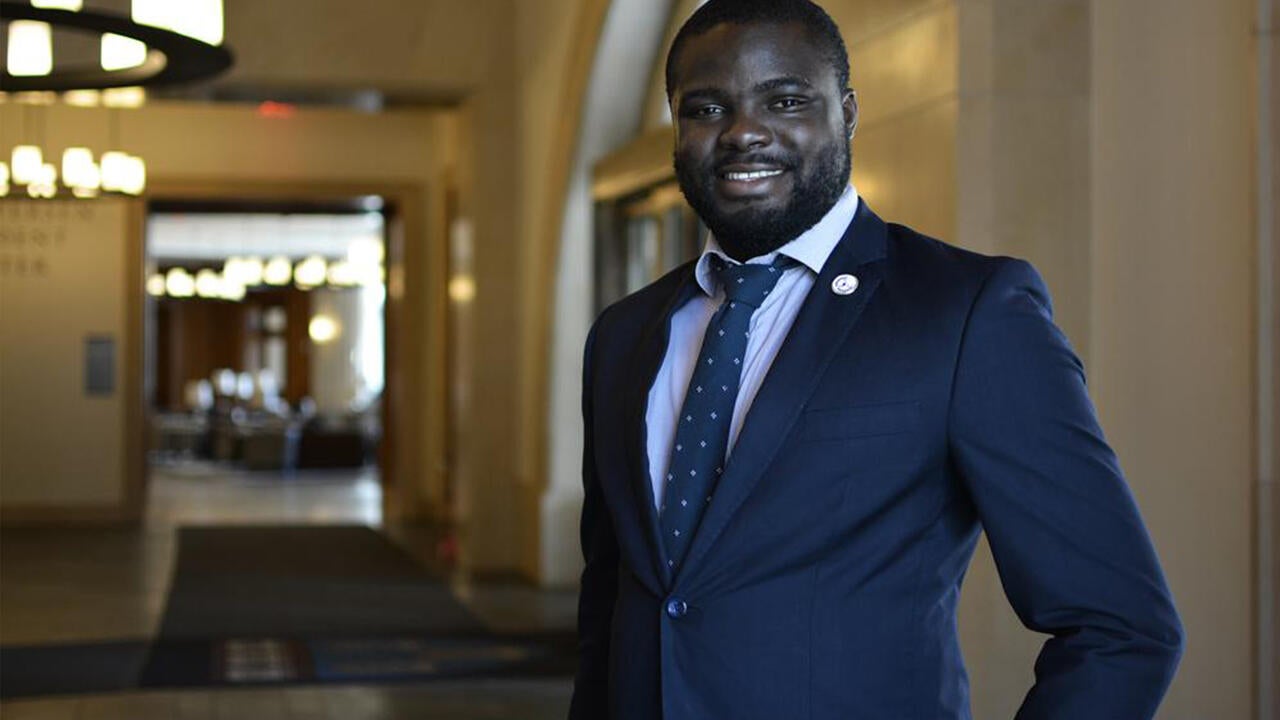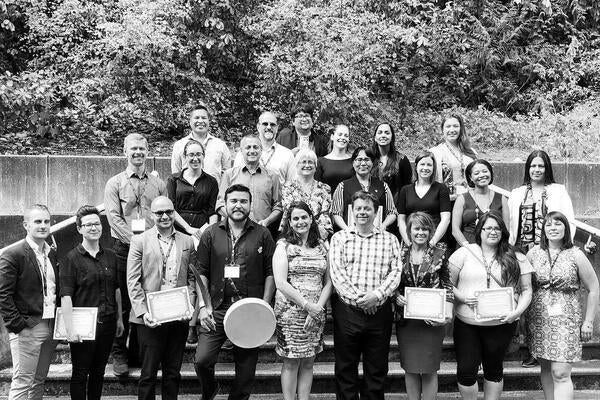
African capital for African innovation
Iyinoluwa “E” Aboyeji is turning Africa’s biggest challenges into global business opportunities

Iyinoluwa “E” Aboyeji is turning Africa’s biggest challenges into global business opportunities
By Natalie Quinlan University Relations
Iyinoluwa “E” Aboyeji (BA ’12)
>Co-founder, Future Africa
Iyinoluwa “E” Aboyeji (BA ’12) is a serial entrepreneur who doesn’t consider his ventures a success unless they improve society.
“That’s the ethos that guides my work,” says Aboyeji, co-founder of Future Africa — a company dedicated to providing African innovators with a community of coaches, capital investors and a network of business connections.
A graduate of the Faculty of Arts legal studies program and an alumnus of Waterloo's St. Jerome's University, Aboyeji says the co-operative education program initially drew him to Waterloo. But when he didn’t get accepted into it, Aboyeji found his community in Velocity, the University’s flagship entrepreneurship program.
“Waterloo had a huge influence on my entrepreneurial career. I say this everywhere I go,” Aboyeji says. “I had a safe space for making tons of mistakes and I did make them all. That got me prepared for an entrepreneurial path when I graduated. If I didn’t go to Waterloo, I wouldn’t be where I am today.”
Leveraging African capital to solve African problems
Like his other ventures, Andela and Flutterwave, Future Africa is built on a foundation of improving opportunities for Africans. With Aboyeji's large social media presence of more than 100,000 followers on Twitter alone, Aboyeji regularly expresses his deep commitment to building an investment firm that explicitly leverages African capital to solve African problems.
“A lot of people think the solution to these problems is to demand equality, but my training teaches me that it’s not enough — you can’t demand equality from people who aren’t incentivized to give it to you, you actually have to take it,” Aboyeji says. “You have to organize and be able to create your own capital stack … because what happens when Black people don’t get funded is that they can’t solve the problems that matter to them.”
Learning and growing in Waterloo’s startup community
Aboyeji’s commitment to building community is grounded in his experience in the entrepreneurial ecosystem at Waterloo. It was through this community that he worked alongside other Velocity success stories including Vidyard’s Michael Litt (BASc ’11) and Devon Galloway (BASc ’10), Kik’s Ted Livingston and BufferBox’s Jay Shah (BASc ’11) and Mike McCauley (BASc ’11).
One of Aboyeji’s fondest memories during his time at Waterloo was when Google acquired the startup BufferBox in 2012. “I knew these guys — I used to sit like two seats away from them. That was enough for me to keep going and think, ‘One day, I’ll get my BufferBox moment," he says.
“Community gives you perspective. It’s very easy to get cooped up in a bubble when you’re building things, even after you’ve been successful. Community gives you something to be thankful for and something to strive for.”
Community creates impact
During this time, Aboyeji also learned to take calculated risks. So, when the pandemic hit earlier this year as his team was launching Future Africa, they had to think fast: How could they continue supporting entrepreneurs when pandemic restrictions made it difficult to raise institutional capital?
“We had been putting our own money in,” Aboyeji says. “We were going to go the traditional route and raise money from funds, but we couldn’t travel, and because we couldn’t travel, we couldn’t make trips out to pitch your institutional funders. We also realized that a lot of people, because of COVID-19, had a lot of disposable income. They weren’t spending money in restaurants or transporting themselves to work, so they had a lot of spare cash."
That spare cash turned into investments of $5,000 and above from co-investors who invested in startups Aboyeji considered high return and high impact. Admission to this community was $1,000 per year.
“We made close to $100,000 through the crisis just from selling memberships,” Aboyeji says. “And that’s how we started. That was instrumental to our existence in our current model as a company.”
With unemployment rates of 60 per cent in Africa, Aboyeji is committed to using his network to support the 300 million young people who need work between now and 2050. This communal formula hasn’t failed him yet.
“We recognize that there’s a pattern with companies that are founding, backing or investing as angel investors,” Aboyeji says. “And that pattern is very simple — tackle the great challenges by turning them into global business opportunities.”

Read more
Savanah Seaton wants to help employers create workplaces where Indigenous employees can feel a sense of belonging and fully contribute their untapped knowledge, skills and abilities.

Read more
Gig work is transforming our global economy and public health as workers weigh risks every day in precarious, low-wage jobs to deliver us food and parcels

Read more
A PhD student partners with Indigenous elders and fishers to understand a changing fish population in Nunavut
The University of Waterloo acknowledges that much of our work takes place on the traditional territory of the Neutral, Anishinaabeg and Haudenosaunee peoples. Our main campus is situated on the Haldimand Tract, the land granted to the Six Nations that includes six miles on each side of the Grand River. Our active work toward reconciliation takes place across our campuses through research, learning, teaching, and community building, and is co-ordinated within the Office of Indigenous Relations.